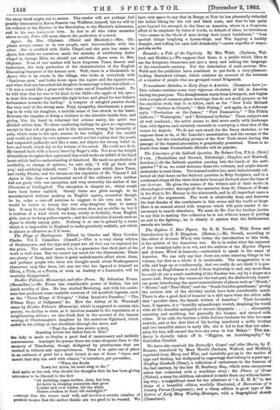Brother Fabians Manuscript, and other Poems. By Sebastian Evans. (Macmillan.)—Mr.
Evans has considerable power of diction, but not much novelty of idea. He has studied Browning, and with his assist- ance has produced some readable versions of old monkish legends, such as the "Three Kings of Cologne," "Judas Iscariot's Paradise," "The Fifteen Days of Judgment," &c. How the Abbey of St. Werewulf came by Brother Fabian's Manuscript, which is supposed to contain this poetry, we decline to state, as it involves scandal to the reputation of a neighbouring abbess ; we also think that in the account of the famous wooing of Charlemagne's daughter by the audacious Eginhard, which ended in his riding on her shoulders through the snow, and
"Past the elm tree scarce a pace, Standing before her father face to face,"
the lady is made to display a good deal of unnecessary and unlikely amorousness. Amongst tho poems there are some eloquent lines to the memory of Thackeray, though disfigured by prettlnesses that are worked in without any appropriateness. Thus it is quite out of place in an outburst of grief for a dead friend, in one of those "times and moods that slay the soul with silence," to introduce, par parenthese,
"When the floods Yawn for Anion, he must sing or die !"
And again at the end, why should the thoughts that he has been giving utterance to be likened to the flow
"Of bubbling organ-trebles, clear, but low, At dawn in sleeping nunneries that grow
Louder and ever louder, till the white
Sisters awaken to their old undelight ?"
—except that the verses read well, and involve a certain number of poetical images that the author thinks are too good to be wasted. We
have only space to say that in Rouge et Noir he has pleasantly defended the ladies' liking for the red ' and black coats, and that he has quite gone beyond his strength in the lines on America, where in a desperate effort to be emphatic by force of words, in default of ideas, he introduces "two curses in the blood of men laving their hoary loathliness," "four spotted things laughing a hyena-dirge, and War lapping a loathly draught, and rolling his eyes half-drunkenly,"--mere ampullas et sesqui- pedalia verba.


































 Previous page
Previous page